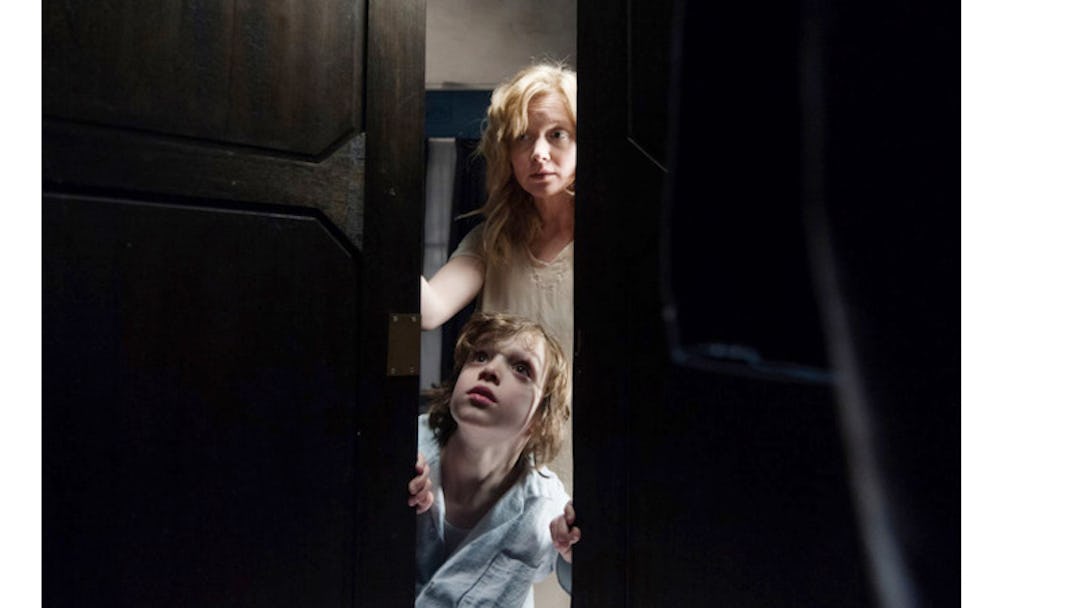The Babadook, the gripping new horror film from Australian director Jennifer Kent, is a movie filled with terrifying sequences and things jumping out from the dark, but for this viewer, the scariest scene in it happens in broad daylight. Single mother Ameila (Essie Davis) is at the park, chatting with a friend as her son Samuel (Noah Wiseman) frolics on the playground equipment nearby. As the conversation escalates in intensity, Samuel starts yelling for his mummy to watch him. She doesn’t. The music gets more harrowing, the close-ups get tighter, the kid yells louder — and I could barely keep my eyes on the screen. I’ve been at the playground with my kid; I know the danger of zoning out, for even a second. In that scene, and throughout the film, Kent is tapping into something far more unnerving than serial killers or the supernatural: the everyday terror of being a parent. It’s an approach that has produced some of the scariest movies of our time.
The narrative is compact and simple, as the best horror stories so often are. Amelia lives with Samuel, who is about to turn seven years old. Every year, his birthday serves as a ghoulish anniversary: his father was killed in an auto accident while driving Amelia to the hospital to deliver the baby. That association manifests itself in an alarming emotional remove; she’ll push away from Samuel’s hugs, and pull away from him, to the edge of her bed, when they co-sleep. So things aren’t so hot in this house even before the creepy book shows up.
The terrifying volume, called Mr. Babadook, just appears on Samuel’s bookshelf one day, a pop-up book about a sinister figure who appears from the shadows that Samuel already insists hold a monster. The last several pages of it are empty, but it scares Samuel (and Amelia) enough for her to first hide the book, then tear it up and throw it away. Yet it keeps turning up, like a bad penny, and when it does, those empty pages are filled with horrifying descriptions of exactly what Mr. Babadook will do to the mother and child — and what they’ll do to each other.
Thus, Kent’s screenplay is a model of ruthless narrative efficiency: the most disturbing, worst-case outcome is laid out right there on the page, and then we, as an audience, know exactly what to fear. But beyond that, it all seems plausible, because the picture is so totally grounded in a recognizable reality of domestic (and later psychological) horror. It’s a film that knows the feeling of stress in parenthood — the helplessness of hearing screaming in the backseat, the agony of staying up with a sick kid, the way time can seem to stop in the thick of a sleepless night. Kent starts by sticking in the knife of everyday parenting terror, and then, over the course of 90 minutes, she gives it a long, slow twist.
Over the course of that running time, which begins to play like a waking nightmare and/or insomniac haze, it becomes clear that we should worry less about what the monster is capable of and more about the mother. It’s not quite clear how much of this is in her head, but however you slice it, Mr. Babadook awakens a darkness inside her, to the extent that she doesn’t know what she’s saying (and, later, doing). Once that question is on the table, all bets are off — and that’s when the picture gets particularly stressful, upsetting, and, ultimately, effective.
This is its genius, and what it has in common with the classics of the genre. Rosemary’s Baby and The Exorcist are routinely pinpointed as the twin births of the modern horror movie, and what they share (aside from masterful craft, brilliant performances, and relentless tension) is a common subject: parenthood. Rosemary’s Baby considers pregnancy, as few other films do, as a harrowing, solitary ordeal, even without the ultimate payoff of discovering your offspring is the seed of Satan. And The Exorcist begins with much of the same premise as this film — how a parent is to proceed when there’s something clearly very wrong with your child, and frames its horror through the eyes of a parent who is paralyzed by what they (in The Babadook) or that child (in The Exorcist) are capable of.
Countless other scary pictures are likewise rooted in the questions of child-rearing, from The Omen to Poltergeist (which gets a couple of explicit, visual shout-outs here). It has been said, and often, that the appeal of horror movies is similar to roller coasters: we like the build-up and the release, the intensity of the anticipation and the free-for-all of the payoff. It is, in other words, fun to be scared. But movies like The Babadook, The Exorcist, and Rosemary’s Baby don’t fuck around like that. When the stress and stakes are so palpably familiar, they aren’t “fun” in that same way, at least for those whose reality — and nightmares — they invade.
The Babadook is out Friday in limited release and on demand.
